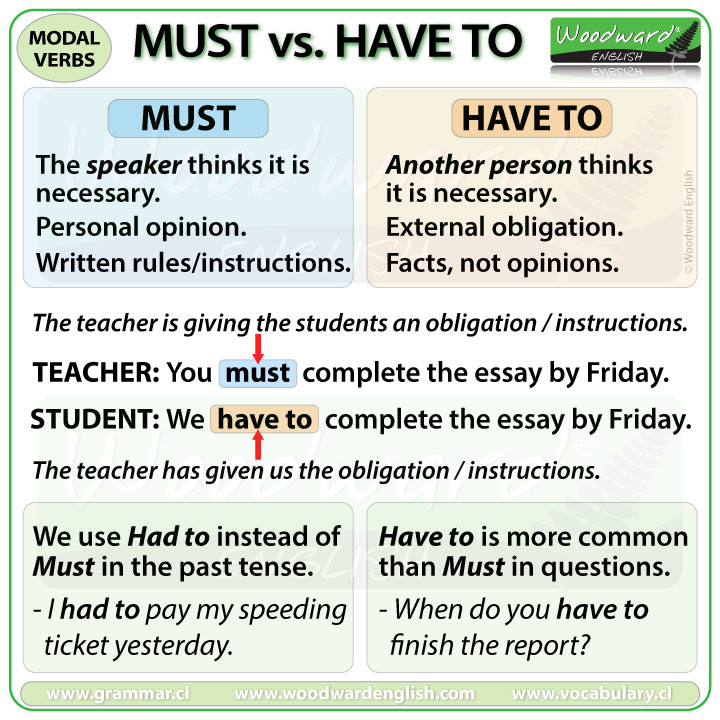In our last lesson, we saw how to use the modal verb MUST in English.
Sometimes HAVE TO is used instead of MUST.
For example you may hear:
- I must write a letter to John. OR
- I have to write a letter to John.
What is the difference between MUST and HAVE TO?
MUST and HAVE TO are both used to express an obligation, responsibility or necessity.
While Must can generally be replaced by Have to in the present tense, there is sometimes a slight difference in meaning or use.
Let’s look at our previous example using MUST:
- I must write a letter to John.
We generally use must when the speaker decides that something is necessary, or needs to be done.
In this case I have decided that I need to write a letter to John. Nobody else has told me to write it. I think it is necessary.
The other example with HAVE TO.
- I have to write a letter to John.
We use have to when somebody else other than the speaker has made the decision.
So here, I didn’t decide to write a letter. Somebody else has told me to write it, somebody else told me it was necessary to do.
Let’s look at some more examples:
- I must book a hotel for my trip next week.
Here I am reminding myself that it is necessary to do. I have decided that it is necessary.
- We have to wear a uniform at work.
Our boss makes us wear a uniform. It is an obligation that our boss has decided that is necessary. I, the speaker, am not making this obligation, someone else is.
Compare the following sentences:
- The Teacher says: You must complete the essay by Friday
- The Student says: We have to complete the essay by Friday.
The teacher has used MUST because he or has is giving the students an obligation.
Since the teacher has given us the obligation, we use have to. This is because somebody else, in this case the teacher, has told us what needs to be done.
When we mention someone else’s obligation, then we use the correct conjugation of Have to.
For example:
- Mike can’t come because he has to work tomorrow.
It is Mike’s obligation to fulfill his work commitments.
- Susan and Steve have to pay their rent every Friday.
They both have the obligation to pay their rent on that day.
In both examples you would not use MUST because we are talking about someone else’s obligations.
Questions – Must or Have to?
For questions it is much more common to use Have to instead of Must (Must sounds very formal):
- When do you have to finish the report?
Normally, you will not hear someone say “When must you finish the report?” as it doesn’t sound natural.
Note however that you may still hear MUST used in questions, though mainly in British English.
- Must you leave right now? (Possible, though rare. More likely in British English)
- Do you have to leave right now? (Much more common in general spoken English)
MUST in different tenses
Must is only used in the present tense and sometimes to express the future. We use a form of have to for the other tenses.
The past tense of Must is Had to:
- I had to pay my speeding ticket yesterday.
- She had to give a presentation to her boss.
The future tense of Must is Will have to:
- I will have to leave work early tomorrow.
In spoken English we would use the contraction I’ll instead of I will. I’ll have to leave…
However, sometimes Must is also used to express future obligation.
- I must leave work early tomorrow
Though the version with will have to is much more common.
Have to vs. Have got to
In informal English, have got to is sometimes used instead of have to.
Note that the subject and have/has are almost always contracted before got to in spoken English.
I’ve got to … is a contraction of… I have got to … which is the same as … I have to.
He’s got to … is a contraction of… He has got to … which is the same as … He has to.
Let’s look at the three ways of saying the same thing:
- I’ve got to tidy my room before I can go out.
- I have got to tidy my room before I can go out.
- I have to tidy my room before I can go out.
Some more examples:
- We’ve got to study for the exam. (We must study for the exam)
- She’s got to bring her ticket or she won’t get in. (She must bring her ticket, or she has to bring her ticket)
- He’s got to be more patient. (He must be more patient)
Here are two sentences:
- I have to wash the dishes.
- I’ve got to wash the dishes.
They both mean the same thing.
However, when an adverb of frequency is used, have to used instead of have got to.
- I normally have to wash the dishes. (this is correct)
- I’ve normally got to wash the dishes. (this is NOT used)
MUST vs. HAVE TO Summary Chart
In general, Have to is more frequent in conversation (or spoken English) than Must.
Must is used more in formal writing, especially in written notices, rules or instructions.

